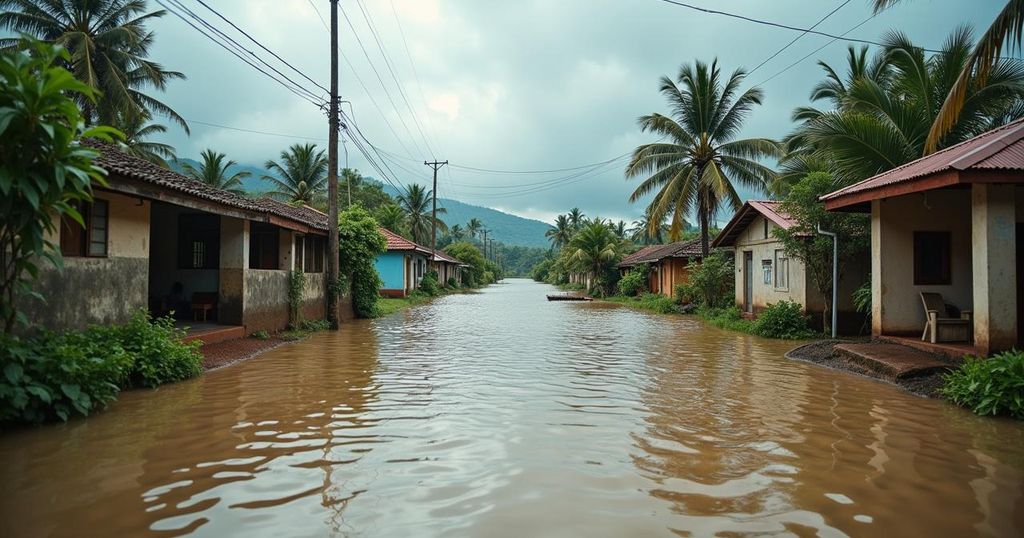Devastating Flooding in West Africa: A Crisis Exacerbated by Climate Change and Infrastructure Weakness

West and Central Africa have experienced extreme flooding, with over 1,000 deaths and millions affected in recent weeks. Significant impacts are observed in Nigeria, where inadequate infrastructure and a collapsing dam exacerbated the disasters, mounting concerns about the role of climate change and the need for international support for recovery and mitigation efforts.
In recent weeks, extreme flooding has profoundly affected West and Central Africa, resulting in mass disruptions and significant loss of life. Reporting for Inside Climate News, graduate student Nana Mohammed, who hails from northeastern Nigeria, provides a harrowing account of this climate catastrophe, which has claimed over 1,000 lives and impacted more than 4 million residents across several nations, including Nigeria, Mali, Senegal, and Chad. With the largest city in northeastern Nigeria, Maiduguri, experiencing severe flooding, Governor of Borno State disclosed that nearly 2 million people in the region are now in dire need of food and shelter following these catastrophic rains. Isma’il Alfa Abdulrahim, a local journalist, described the grave situation his family faced, stating, “Twenty-two of my family members were caught in this flood. So, I had to rush for rescue.” He has witnessed firsthand the devastation, noting that many individuals, including vulnerable children and pregnant women, remain trapped and without basic necessities such as food and water. The flooding’s scale bears a resemblance to the multi-faceted crises already faced by the region, including ongoing conflicts exacerbated by groups like Boko Haram. Abdulrahim starkly contrasted the effects of the flood with past events, emphasizing the increase in unaccompanied and missing children. Dr. Vincent Nduka Ojeh, a climatologist from Taraba State University, highlighted the unprecedented nature of rainfall received in Borno, positing that the intensity of precipitation caught many unprepared. He lamented the lack of governmental response to warnings regarding the deteriorating state of infrastructure like the Alau dam, which ultimately collapsed and precipitated this disaster. This catastrophe reflects broader systemic issues, including inadequate awareness and understanding of climate change, corruption within local governance, and insufficient capacity to adapt to crisis conditions. Mohammed emphasized that Nigeria faces multiple environmental challenges exacerbated by climate change, and Aboriginal people currently lack the necessary resources to respond effectively. This crisis necessitates urgent assistance from wealthier nations through international funding mechanisms designed to address loss and damage associated with climate impacts. Failure to act decisively may result in an escalating toll of climate-related tragedies, especially as disasters increase in intensity and frequency due to global warming.
The article addresses the severe flooding that has recently ravaged parts of West and Central Africa, significantly affecting countries such as Nigeria, Mali, Senegal, and Chad. It underscores the broader implications of climate change, illustrating how developing regions face compounded risks due to inadequate infrastructure, limited resources, and the mounting impacts of climate disruption. The narrative is enriched by firsthand accounts from local journalists and experts, illustrating the human toll and systemic failures that exacerbate such disasters. The discussion extends to international responsibility and the need for global financial support to assist vulnerable nations.
The ongoing flooding in West and Central Africa serves as a stark reminder of the devastating effects of climate disruption, which exacerbates existing vulnerabilities in the region. The loss of over a thousand lives and the displacement of millions necessitate urgent attention and action from global powers to support adaptation and recovery efforts in disaster-stricken areas. The voices of those directly affected, alongside expert insights, highlight the crucial intersection of climate change, governance, and the need for effective infrastructure investments to mitigate future disasters in the region.
Original Source: insideclimatenews.org






